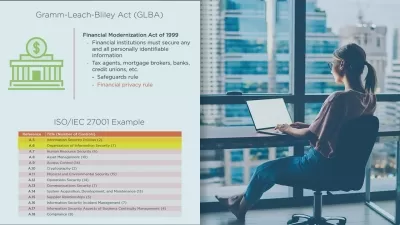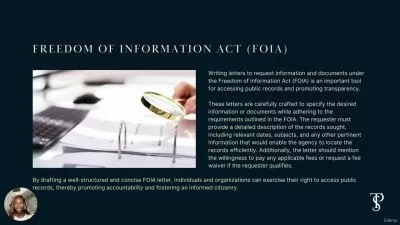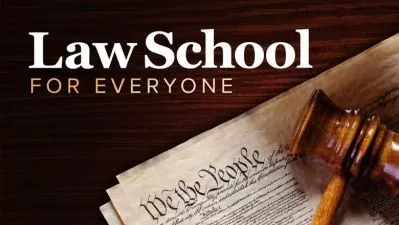Law School for Everyone: Legislation and Regulation
Peter J. Smith
6:16:49
Description
When many of us think about the law, we think of a judge wielding a gavel with authority. The truth, however, is that in the United States, laws are more likely to be enacted by a legislature or a regulatory agency than simply announced by a court.
The subjects of legislation and regulation are at the heart of how laws are understood and applied every day. A relatively recent addition to more traditional law school topics like torts and contracts, these subjects are becoming more and more of a mainstay in some of the country's top law schools. Given the increasingly prominent role of legislation and regulation in today's national discourse, it's critical for law students and everyday learners alike to understand how these forms of law govern countless aspects of our lives--including everything from workplace safety to the vehicles you drive to the speed of your internet connection.
With Law School for Everyone: Legislation and Regulation, award-winning law professor Peter J. Smith of The George Washington University Law School makes these vital areas of American law accessible to anyone who wants to know how lawmakers and lawyers navigate their many complexities. Over the course of 12 nuanced and balanced lectures, you'll get the opportunity to examine a host of topics, including:
- The nature of regulation;
- The merits of lawmaking by legislation;
- The challenge of interpreting statutes; and
- The role of federal agencies in our legal system.
Along the way, you'll confront intriguing—and controversial—questions about the letter versus the spirit of the law, how much authority independent federal agencies should have, and when a court or the president should step in to impose their own interpretations. Taken together, these lectures are a guide to how we, as citizens, can make sense of the law so we can comply with it—or challenge it when necessary.
Learn How Legislation is Enacted and Understood
Continual disagreements over the efficacy of legislation and regulation, as well as how they should be applied, can bring out the inner cynic in many of us. In Law School for Everyone: Legislation and Regulation, Professor Smith reveals how a thorough understanding of the legislative process and regulatory system is crucial to resolving disputes over the meaning of the law and the scope of government regulation.
His lectures will introduce you to the skills and concepts that lawyers use every day to operate on this crucial battleground of the American legal system, including:
- Statutory Interpretation: In a perfect world, the law would give us clear notice of what conduct is permissible and what conduct is prohibited. But quite often, opposing parties come to very different conclusions about what the law says. An 1892 Supreme Court case offers you a fascinating window into how statutes are interpreted.
- The Letter of the Law: Some scholars believe confining a legal inquiry to a statute's plain meaning is the only way to ensure judges don't cross the line between interpretation and policy-making. Relying on the letter of the law requires one to focus on the literal meaning of a law's text.
- The Spirit of the Law: Is the best way to implement the legislature's wishes to have courts read the statute in light of the legislature's purpose? Judges who focus on the spirit of the law look first and foremost at the intent behind the author or authors of a law's text.
- Canons of Construction: Courts have devised semantic and substantive canons for reading statutes. Among the many you'll explore in these lectures are noscitur a sociis, which refers to how words in a statute derive meaning from the words they're grouped with, and expressio unius, often used when interpreting statutes that contain lists.
Examine the Nation's Regulatory Bodies
In order for legislation to control the behavior of the body politic, there needs to be someone to enforce the rules. That's where regulatory bodies—such as the Federal Communications Commission and the Food and Drug Administration—enter the picture.
Law School for Everyone: Legislation and Regulation covers the authority given to these and other federal agencies. You'll learn how they work and how courts can balance their authority. Along the way, you'll get introductions to concepts like the intelligible principle—the standard, set by Congress, designed to guide and limit an agency's authority—and hard-look reviews—court-conducted reviews designed to focus on the substance of agency decision making.
Throughout these lectures, Professor Smith also tackles questions of constitutional dimension, including:
- Who should get to decide the meaning of a particular regulatory statute?
- Do judicial controls on agency policy-making promote reasoned decisions?
- How do we keep agencies from becoming a veritable fourth branch of government?
- Is the enterprise of statutory interpretation hopelessly incoherent and unpredictable?
Confront Intricate Legal Issues
Professor Smith is no stranger to teaching concepts of law to our lifelong learners. A previous Great Courses professor, he brings the same real-world experience and award-winning teaching style to this course as he did to his previous lectures.
As a former attorney at the U.S. Department of Justice, Professor Smith worked to defend a number of federal statutes in cases that went to the Supreme Court. This vital experience means he delivers these lectures from the position of a practicing lawyer as well as a scholar and teacher.
Who establishes the laws of our country, and how should they be interpreted? These are questions that continue to power today's news headlines. And with Law School for Everyone: Legislation and Regulation, you'll find yourself better prepared to answer them.
More details
User Reviews
Rating
Peter J. Smith
Instructor's CoursesPeter J. Smith is the Arthur Selwyn Miller Research Professor of Law at The George Washington University Law School in Washington, D.C. He received his B.A. (magna cum laude) from Yale University and his J.D. (magna cum laude) from Harvard Law School, where he received the Sears Prize for highest academic performance.
Before joining the faculty at GW Law, Professor Smith was an attorney at the U.S. Department of Justice, where he represented the government in the U.S. Courts of Appeals. At the Department of Justice, he defended the constitutionality of a number of federal statutes, including the Family and Medical Leave Act and the Food and Drug Administration Modernization Act (cases ultimately resolved by the Supreme Court). Before he worked at the Department of Justice, Professor Smith clerked for Judge Phyllis A. Kravitch of the U.S. Court of Appeals for the Eleventh Circuit.
Professor Smith has twice received the Distinguished Faculty Service Award for outstanding teaching at GW Law. He has published dozens of scholarly articles and is the co-author of a popular casebook on constitutional law, Constitutional Law: A Contemporary Approach. His research focuses on constitutional law, constitutional interpretation, and civil procedure.

The Great Courses
View courses The Great Courses- language english
- Training sessions 12
- duration 6:16:49
- English subtitles has
- Release Date 2023/06/06






















